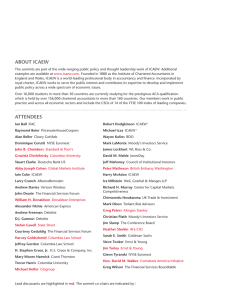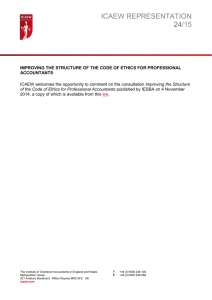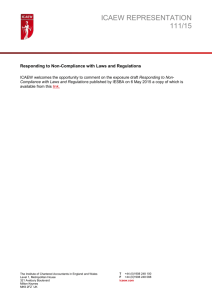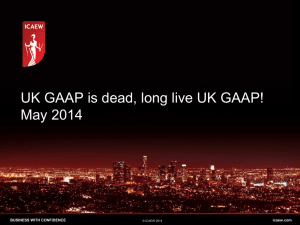public sector finances – challenges ahead
advertisement
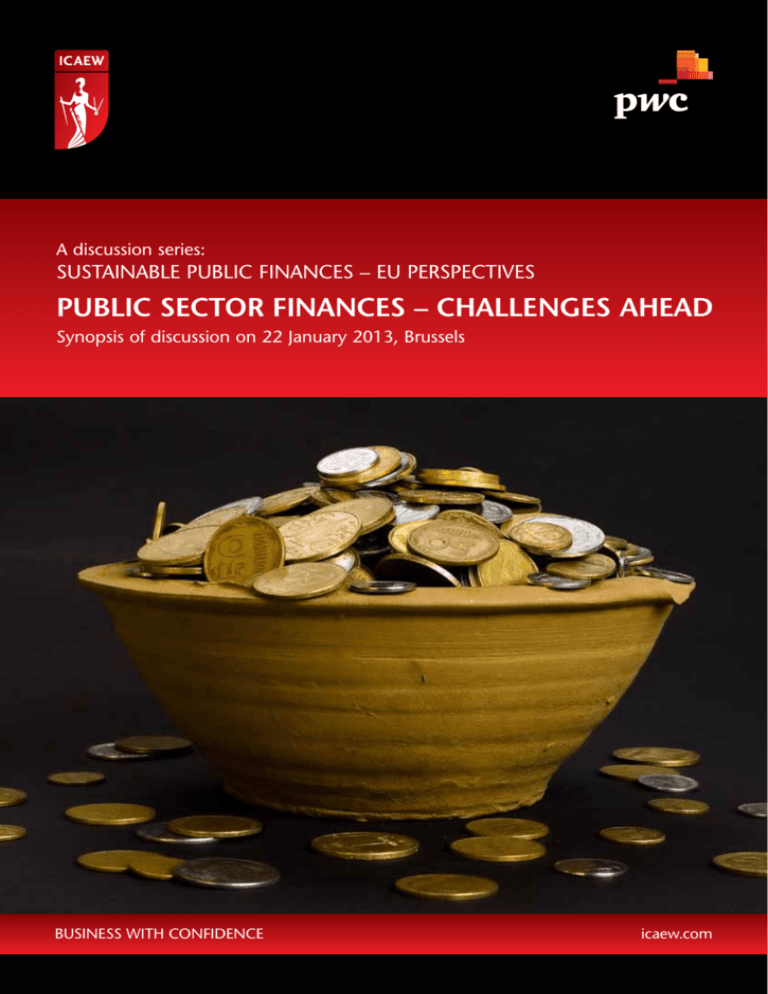
A discussion series: SUSTAINABLE PUBLIC FINANCES – EU PERSPECTIVES PUBLIC SECTOR FINANCES – CHALLENGES AHEAD Synopsis of discussion on 22 January 2013, Brussels BUSINESS WITH CONFIDENCE A plan for growth icaew.com 04 INTRODUCTION The global financial and economic crisis is bringing about profound changes in international, financial and government institutions. In Europe, the crisis has also drawn particular attention to the poor quality of financial management, reporting and governance in the public sector highlighting the need for greater action to address these interconnected shortcomings. At this critical stage in policy development, ICAEW is bringing together key decision-makers and experts with a wide range of perspectives to help advance the discussion on how to promote better financial management, transparency and accountability in the public sector throughout Europe. On 22 January 2013, a senior group of decision-makers and stakeholders came together to exchange views on such issues. The meeting was the first in a series of informal discussions being organised by ICAEW in 2013 with support from PwC. This brief synopsis seeks to capture the key elements of the first discussion to encourage feedback and further development of the ideas raised during the dinner. It also aims to inform other key stakeholders who have an interest in the overarching theme of sustainable public finances in Europe and who may wish to contribute to the subsequent discussions taking place in Brussels in 2013. We would be delighted to receive comments on the synopsis, to be addressed to: ICAEW Europe Region Rue de la Loi 227 1040 Brussels Belgium T +32 2 230 32 72 E europe@icaew.com 02 next DISCUSSIONS Over the course of 2013, three further discussions will be held to discuss progress on reforms to enhance financial management, transparency and accountability in the public sector throughout Europe. It is expected that the discussions will provide an opportunity to comment on the overarching theme of sustainable public finances in Europe. Equally, in order to provide fresh input into the debate, each of the subsequent discussions will explore a particular aspect in greater detail, as follows: Regional and central government perspectives 23 April 2013 Democratic accountability and fiscal sustainability June 2013 Views from international institutions September 2013 Public sector finances – challenges ahead Synopsis of Discussion ‘Public sector finances – challenges ahead’ Although we must focus on the positive, we must also be prepared to face the difficult legacy left by the sins of the past. We still underestimate the seriousness of the problem in many member states. The process is about re-educating citizens on public sector service and accountability and re-educating the markets to look more closely at countries when judging the credit risk of lending to them. Actions in Europe will set an example that other countries across the world will be watching. It is time to act boldly. As the first in the series, the discussion on 22 January 2013 focused on the overarching theme of how to address the major challenges in enhancing financial management, transparency and accountability in the public sector throughout Europe. In order to structure the discussion, three focus areas were identified: The extent of the challenge What is the extent of the challenge in terms of shortcomings in public sector management, transparency and accountability in Europe? Where are these shortcomings most acute and how do they manifest themselves? Can helpful comparisons be made with transparency, accountability and reporting developments in the private sector? Learning from international examples The path ahead for Europe How can the EU develop a clear path to enhancing public sector financial management, transparency and accountability? How can policy-makers and stakeholders generate and sustain momentum for reform? How will any approach agreed by the EU relate to global developments in this area as well as the development of international standards? The extent of the challenge As a starting point, it is important to note that public sector management, transparency and accountability are all key elements in addressing the broader challenge of maintaining Europe’s overall high standard of living. Better management of current resources and improved planning for future needs are imperative to ensure the continuing capacity to fund, for example, advances in healthcare and to benefit from increasing longevity. In the overwhelming majority of EU member states, however, this management and forward planning is all too often inadequate. While this inadequacy derives from many different elements, serious shortcomings in public sector accounting and reporting are a significant contributory factor and also constitute missed opportunities to help drive reform. Across the EU public sector accounting rules are anything but clear and far from comparable. Pension liabilities are a particularly difficult issue: in many cases governments have assumed commitments which are not fully integrated into their accounting bases and consequently into their long-term planning. This raises questions as to the true extent of the public debt and of the ‘sins of the past’ accumulated from similar treatment of other public commitments. The issue is acute as the huge legacy of public debt is already acknowledged to be a significant obstacle to economic recovery. There is an urgent need to be upfront and transparent about the extent of the challenge that Europe faces. What can EU decision-makers learn from reforms already undertaken in public sector financial management and reporting in Europe, across the world and by international organisations? What lessons can be drawn regarding both internal governance and management and external interaction with key stakeholders and the public at large? Public sector finances – challenges ahead 03 At EU level, the adoption of the ‘Six-Pack’ rules for economic and fiscal surveillance in 2011 was an important step forward. EU policy-makers have also signalled their intention to address public sector reporting by launching preparatory feasibility studies vis-à-vis the possible introduction of International Public Sector Accounting Standards (IPSAS) in member states. However, many member states continue to resist including liabilities such as public sector pensions in their national accounts. A considerable degree of opaqueness remains, therefore, and in many cases there is a reluctance to shed further light on the full picture of public finances. It should not be overlooked that with accrual accounting, public sector entities are required to identify, value and record in their balance sheets the multitude of public sector assets and liabilities. For years, financial markets seemed to pay scant attention to public sector reporting. The fact that banks increased their holdings of sovereign debt after 2008 as a safe asset bears this out. In 2010 the markets finally woke up and there was a cataclysmic collapse of confidence in sovereign debt. Still, it is not clear that this was triggered by a greater understanding of the underlying financial situation. The nature of interaction between government reporting and allocation of market funds needs to evolve – and markets should react positively to greater transparency. Accounting standards for the private sector have often been a sensitive topic in Europe, although the EU took a major step forward in the early 2000s with the adoption of International Financial Reporting Standards (IFRSs), drawing considerable international attention. The economic environment is very different today. It is open to discussion how the overall economic environment can impact the willingness to introduce new standards which shed light on previous ‘sins’. While the experience of the private sector can be helpful in many respects, there are public sector specificities that need to be taken in account, as does the broader interaction between the public and private sectors in periods of market volatility. Overall, public sector management, transparency and accountability across the EU is still characterised by considerable shortcomings which are not conducive to sustainable public finances in the EU. Learning from international examples While the public sector is a diverse landscape, both in Europe and across the world there are successful cases of public finance management and reporting reform which can serve as useful examples. Globally, there is a clear and encouraging trend towards accruals accounting, replacing cash-based accounting – a key feature of better financial management, transparency and accountability in the public sector. Governments that have introduced reforms have found that accrualsbased systems enable more effective accounting and performance measurement. This can help strengthen democratic accountability for spending decisions. 04 In pursuing reform, it is clear that governments have to reconfigure their practices and systems. Governments are more accustomed to producing budgets, rather than balance sheets which require identification of assets and liabilities. The production of a government balance sheet can result in a stark picture of the level of debt and the extent of liabilities. Such reform exercises also draw out the need for better explanation of how national accounts differ from those of private companies, for example in relation to future tax income. Other difficult, but not insurmountable, issues have been highlighted, including how to deal with discount rates and valuation of assets for which there is no market price, including banks nationalised during the financial crisis. The question of defence spending is also challenging from a public reporting perspective. Still, existing evidence underlines the strong case for governments to enhance transparency with regards to their public finances. Transparent governments that use accruals accounting appear able to borrow more cheaply on international markets. When a government draws up a balance sheet, it enhances governance. It enables policy-makers to see the cost of decisions in real time and to engage on a different basis with stakeholders and the public at large. In the most advanced cases, the regular publication of a government balance sheet generates greater public awareness and enhances the level of debate and understanding of the constraints facing elected governments. Austerity-driven budget cuts have also given some governments a greater appreciation of accruals accounting as a tool for better decision-making on how to allocate scarce resources. Yet in many cases the move to accruals-based budgeting is either not being pursued or is being significantly delayed after the introduction of accruals-based accounting. Engaging and enhancing public understanding is crucial to reversing the damaging spiral between poor accounting and a lack of demand for information. Both need to be tackled at the same time. Experience shows that a successful transition to improved financial management and reporting requires leadership, improved governance, adequate attention to management process and investment in skills and resources. Within a number of international organisations, the transition to accruals-based accounting has proved successful in reasonable time frames. The European Commission is an example of this, having based its reforms on IPSAS compliant standards. Similar experiences of other international organisations in reforming their financial management and reporting systems highlight the evolution of an important education process. This involves decision-makers first acknowledging and then acting upon the tough choices required. It encourages the development of a Public sector finances – challenges ahead narrative to explain the context of accruals accounting; the most important communication regards the direction of a deficit, whether it is falling or rising. quasi-governmental entities, such as public companies, as well as tiers of regional and local government. Such areas have proved very problematic in recent years. Investment in skills and capabilities is key: reform is a bottom-up as well as top-down process. Politicians and senior management need to receive sound advice from finance professionals, as well as from other disciplines. There are different views on the most effective way of achieving reform within the EU. Ideally, EU reforms should be aligned across member states. However, given different national perspectives and some resistance, a more pragmatic approach may be needed, at least in the short term. The World Bank’s ROSC� reports have had an impact in encouraging the move towards accruals accounting. It is becoming an expectation that beneficiary countries will move in this direction within five-year timeframes. This can act as an incentive to reform. The path ahead for Europe There is an urgent need for Europe to develop a path to address the serious shortcomings in public sector financial management, transparency and accountability. It is critical for Europe’s long-term sustainability and for the maintenance of many of the positive features and standards of living in the EU. Accruals accounting is fundamental. But it is part of a bigger picture of making politicians responsible for the impact of their decisions on current and future generations. This is one of the greatest public interest issues of our time. At EU level, an important exercise is underway, led by Eurostat, to assess the feasibility of introducing the international standards, IPSAS. It is important that there is an informed debate around this exercise which draws as much attention to the benefits of accrualsbased accounting as to the challenges and costs of its introduction. It is sometimes said that producing balance sheet information is too expensive for national governments. But the cost is minor compared to the shocks which governments can be exposed to from failing to understand their true financial position. The recent episodes of hidden liabilities and unpaid bills in some EU member states demonstrate the need for better use of financial reporting by politicians. Following the adoption of the EU ‘Six-Pack’, the indications are that many member states are reluctant to face up to existing liabilities. There can be a tendency for elected representatives to focus on “fire-fighting” and dealing with immediate recovery from the crisis. But failing to get to grips with the poor quality of financial reporting in the public sector ultimately becomes a challenge for politicians. This is already a “burning platform” and the public’s experience of austerity today clearly indicates that improvements in accounting and accountability are imperative. The need to deal with the on-going economic crisis may influence the views of some governments, dampening any enthusiasm for reform. Yet international experience demonstrates that reform during downturns is possible and highly beneficial. If the EU cannot drive reform through binding legislation, there is the potential to pursue action through the European Semester framework. Peer pressure – ‘naming and shaming’ – may assist to a certain degree. However, efforts to enhance public sector financial management, transparency and accountability would be more effective with clear communication on why reform is being pursued and how it will be achieved. It may be best to focus on an over-arching EU framework for reform, which still gives member states some flexibility while ensuring the traceability of information. In developing and pursuing a clear path to more sustainable public finances the EU could provide an example to the rest of the world. Even in the absence of such action at EU level, member states will come under pressure from markets or the European Central Bank to improve fiscal management and accountability. It appears inevitable that if some move ahead in this area, others will eventually have to follow suit. In any event, the manner in which markets assess the sustainability of sovereign debt in different countries is likely to evolve. To date insufficient attention has been placed on accounting information but this is likely to change. It would be highly beneficial for the EU to outline a clear path to achieving better financial management, to promote a comprehensive step change in qualitative terms in the transparency and reporting of public sector finances. Economic cooperation in the EU depends on mutual trust and confidence in the information that all member states provide. This is also a compelling reason for reform. Reform needs to encompass information on 1 Public sector finances – challenges ahead Reports on the Observance of Standards and Codes 05 KEY OBSERVATIONS AND CONCLUSIONS 1 There are serious shortcomings in the current state of accounting, reporting and financial management within much of the public sector in Europe. This stems in particular from the inadequate application of accruals, both in accounting and budgeting, and the management of government balance sheet assets and liabilities, but the causes and consequences are far broader. The issue of public sector pensions and the debt of quasigovernmental entities, regional and local government are examples of acute shortcomings. They are critical to understanding the real national picture. At stake is the capacity of governments to make and implement decisions which affect the public today and in the future. The consequences of neglecting public sector liabilities and inadequate management of public debt have been all too visible in Europe, through the impact of austerity. 2 There are examples of successful reforms where useful lessons can be drawn. The return on investment is the enhancement of government’s capacity to manage public resources and to improve in public accountability. The real question is not whether reform can be afforded: it is whether member states can afford not to reform. Politicians must pay attention to the poor quality of accounting in the public sector because ultimately they will be held responsible for the consequences. Political leadership is therefore key, but so too is bottom-up impetus – and this requires people with the appropriate skill sets. 3 The EU has a key opportunity to drive reform and, as in the case of private sector accounting, could play a leadership role in the world. The risk is that some short-term considerations may block the recognition of liabilities which would worsen the financial balance sheet of some governments. The incentives for promoting and embedding reform require careful consideration. A shared and positive agenda is needed to ensure that Europe maintains its current high standards of living and quality of life. Greater market attentiveness to financial reporting by member states could help drive reform and could encourage competitive peer pressure. However, it would be beneficial if the path towards better financial reporting is seen as part of a broad consensus to enhance management, transparency and accountability in the public sector across the EU. Accruals accounting is not an end in itself. It is part of a bigger picture of making politicians responsible for how their decisions affect future generations. This is one of the greatest public interest issues of our time. 06 Public sector finances – challenges ahead Appendix: Participants Warren Allen International Federation of Accountants Andrew Baigent UK National Audit Office (seconded to Department of Health) Ian Ball International Federation of Accountants Olivier Boutellis-Taft Federation of European Accountants John Capper European Group of International Accounting Networks and Associations Ian Carruthers International Public Sector Accounting Standards Board Helen Feetenby NATO Vicky Ford MEP European Parliament Brian Gray Former Director General (Budget and Internal Audit), European Commission Karel Van Hulle European Commission Ine Lejeune PwC Martin Manuzi ICAEW Patrice Schumesch PwC Sumita Shah ICAEW Ciaran Spillane European Commission Hans Verheggen PwC Eddy Wymeersch Public Interest Oversight Board Public sector finances – challenges ahead 07 Europe Office T +32 (0)2 230 3272 E europe@icaew.com icaew.com/europe Hong Kong Office T +852 2287 7277 E hongkong@icaew.com icaew.com/hongkong South East Asia Office T +65 6407 1554 E southeastasia@icaew.com icaew.com/southeastasia Greater China Office T +86 10 8518 8622 E china@icaew.com icaew.com/china Middle East Office T +971 (0)4 408 0000 (ext 710000) E middleeast@icaew.com icaew.com/middleeast Malaysia Office T +60 (0)3 2171 6022 E malaysia@icaew.com icaew.com/malaysia ICAEW is a founder member of the Global Accounting Alliance which represents around 775,000 of the world’s leading professional accountants in over 165 countries around the globe to promote services, share information and collaborate on important international issues. ICAEW is a professional membership organisation, supporting over 140,000 chartered accountants around the world. Through our technical knowledge, skills and expertise, we provide insight and leadership to the global accountancy and finance profession. Our members provide financial knowledge and guidance based on the highest professional, technical and ethical standards. We develop and support individuals, organisations and communities to help them achieve long-term, sustainable economic value. Because of us, people can do business with confidence. ICAEW Chartered Accountants’ Hall Moorgate Place London EC2R 6EA UK T +44 (0)20 7920 8100 E info@icaew.com icaew.com A plan for growth linkedin.com – find ICAEW twitter.com/icaew facebook.com/icaew 04 © ICAEW 2013 02/13
